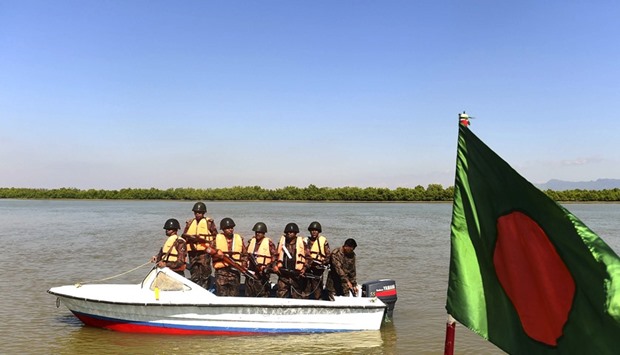Bangladesh has sought support from the international community to resolve the longstanding Rohingya crisis in Myanmar, including the current situation, a minister has said.
Foreign Minister A H Mahmood Ali discussed the Rohingya crisis at a meeting with the diplomatic community. The Rohingyas are trying to enter Bangladesh to avoid
persecution in Myanmar.
“During the briefing, they (foreign diplomats) expressed that they strongly support to resolve the problem through dialogue between the countries,” the minister said, the Daily Star reported.
Highlighting the Bangladesh government’s effort to strengthen the relationship with Myanmar, Mahmood Ali said: “We have strengthened our engagement with Myanmar since the democratic
government assumed in power.”
He also expected that the situation in Myanmar would be normalised soon and the people staying temporarily in Bangladesh would be able to return to their homeland without fear and further violence and
retaliation.
The hour-long meeting with diplomats began at the state guest house Padma in Dhaka around 5pm where ambassadors and high commissioners from different countries including the US, India, China and
European Union were present.
Bangladesh is denying entry to the Rohingyas who are coming in from the Naf river and land ports along the Cox’s Bazar coastline every day.
On Wednesday, Bangladesh’s foreign ministry summoned the Myanmar envoy in Dhaka and expressed concerns over the issue. Dhaka also urged immediate steps to take back the Rohingyas.
Up to 30,000 Rohingyas have abandoned their homes in Myanmar since early October, after soldiers poured into the strip of land in western Rakhine state following deadly raids on border posts.
The refugees who have made it to Cox’s Bazar so far have brought with them horrifying stories of gang rape and murder.
The Myanmar army flatly
denies the allegations.
That Myanmar does not want its more than 1mn Rohingya population is not in dispute.
It refuses them citizenship while many in the majority Buddhist country call the Muslim minority “Bengalis” - shorthand for illegal immigrants.
Bangladesh provides a mixed reception to the Rohingyas.
Although people around Cox’s Bazar have centuries-long historical ties with the Rohingyas, locals increasingly perceive the refugees as a crime-prone nuisance.
Only 32,000 Rohingyas are formally registered as refugees.
The remaining 200,000 scratch an existence without help from government or
charities.
And their numbers swell with every crisis across the border in Myanmar.
To avoid more arrivals Dhaka has periodically blocked refugee boats and called for Myanmar to stop the exodus.
Authorities already tightly control aid workers and arrest people who illegally help the minority.
“Bangladesh has said often that it cannot sustain any more refugees, and in fact, has refused to allow humanitarian assistance to the Rohingyas because it might be a pull factor,” said Human Rights Watch’s South Asia chief Meenakshi Ganguly.
But she added “people don’t leave their homes, make perilous journeys, simply for free blankets and medicines.”
The country’s Home Minister Asaduzzaman Khan on Friday told reporters that Rohingya arrivals would be treated humanely, but so far no aid has reached the new entrants.
That has heaped pressure on pre-existing Rohingya refugee encampments.
“Some 15,000 Rohingyas have already been living here in inhuman conditions for years,” said Dudu Mia, a head of a Rohingya camp, explaining 1,000 people new arrivals came last week.
“There are days many of us don’t have any food either.”
Conditions are fast-deteriorating, hitting
exhausted Rohingya arrivals hard.
For heavily-pregnant Siru Bibu, who fled by boat with four children after her husband and other relatives were killed by an army operation, the situation that has greeted them is dire.
“If it goes another week, my children will starve,” she said.
Rumours abound of under-cover officials keeping strict tabs on who is giving what to the unregistered arrivals at the camps.
On Thursday authorities detained and immediately jailed seven people for to up to two months for assisting the
Rohingyas.
“Anyone trying to help us is warned or being arrested. As a result, the newly arrived refugees are living in fear,” a camp elder said, requesting
anonymity.
Driven from Myanmar and unwanted in Bangladesh, traumatised Rohingya refugees are now laying low.
“Police have arrested some of our neighbours and we heard that they were sent back across the border,” Yasmin Akhter, a 25-year-old mother who was only able to bring two of her six children to Bangladesh.
“I hope they won’t do it to us... I don’t want to die.”

Border Guard Bangladesh (BGB) personnel petrol in the Naf river to stop the illegal entry of Myanmar Rohingya refugees, near Teknaf in southern Cox’s Bazar district, yesterday.
